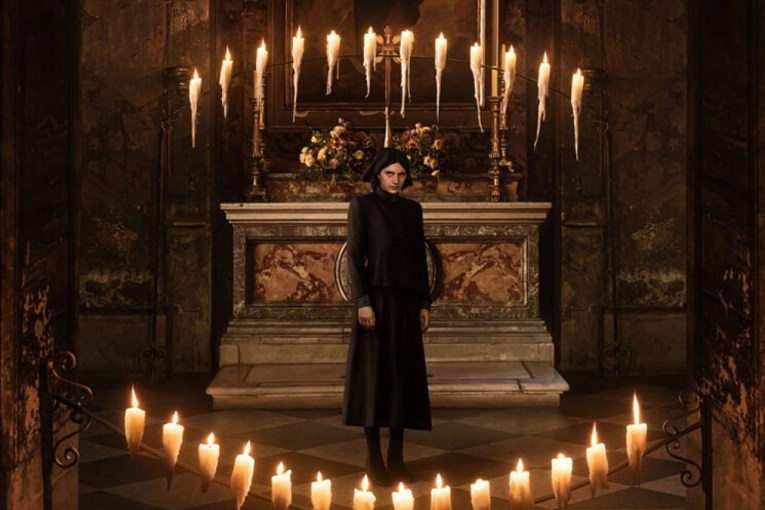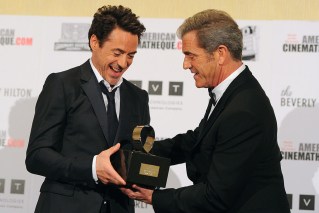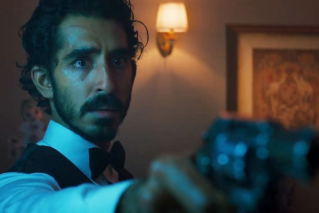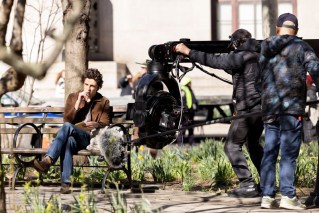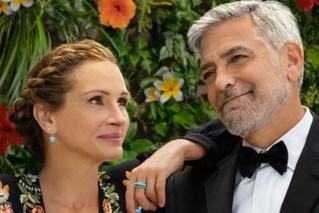‘The Grand Budapest Hotel’ checks out
Director: Wes Anderson
Cast: Ralph Fiennes, F. Murray Abraham, Edward Norton, Mathieu Amalric, Saoirse Ronan, Adrien Brody, Willem Dafoe, Léa Seydoux, Jeff Goldblum, Jason Schwartzman, Jude Law, Tilda Swinton, Harvey Keitel, Tom Wilkinson, Bill Murray, Owen Wilson, and introducing T
Duration: 100 mins
Rating: M
Release Date: 10 April, 2014
The Grand Budapest Hotel has already gotten a hefty nod of approval from critics around the world, with The Telegraph and New York Times both awarding it five stars.
This week, Wes Anderson’s quirky instant classic hits Australian cinemas. Should you go see it this weekend? Definitely.
Stephen A Russell for thelowdownunder.com.au says:
Darkness lurks at the edges of Wes Anderson’s latest comic whimsy, but it’s still cracking good fun.
Wes Anderson might be described as an acquired taste. For everyone who loves his rich visual whimsy, there’s another who just doesn’t get it and probably another still that has no desire to do so. For the record, I’m in the first camp.
The Grand Budapest Hotel is Anderson’s eighth feature and while it doesn’t quite zing with the magical promise of say Moonrise Kingdom, Fantastic Mr. Fox or The Life Aquatic with Steve Zissou, I get the distinct impression he has very purposefully pursued a more melancholic heart than previously hinted at.
Despite the textbook fanciful flourishes, including intricate costumes, the magnificent hotel sets, gorgeous model work, complex camera shots and a host of all-star cameos, there’s the shadowy hand of impending doom hanging over the comic capers.
The usual faces, most notably Bill Murray, Owen Wilson and a heavily old-aged made up Tilda Swinton, appear only momentarily, with Ralf Fiennes taking the lead as the fussily affected concierge of said The Grand Budapest Hotel, Monsieur Gustave. A deliciously foppish creation, his impeccable façade and exacting attention to detail are only occasionally betrayed by foul-mouthed tirades and his propensity to sleep with older lady guests for a slice of their inheritance. Tony Revolori plays his whipping lobby boy sidekick Zero as they pander to rich guests in the building’s interwar, 1930s heyday.
This glorious past is framed by two narratives. One which bookends the film sees Tom Wilkinson as a successful writer recalling his youthful stay at the Budapest to his son. Jude Law portrays his younger self in a drab, Communist 1968 when the hotel has fallen into physical and financial disrepair.
He encounters the hotel’s mysterious owner Mr. Moustafa (F. Murray Abraham) who then relays his own recollections of the establishment’s glory days. This intertextual frivolity belies the darker heart at play here that’s less familiar in Anderson’s oeuvre. This fictional Republic of Zubrowka is, of course, about to face unimaginable horror as WWII and its aftermath play out, though Anderson’s fantasy doesn’t play this to its natural conclusion, skipping lightly over disaster with only the briefest of hints.
There’s no room for unfettered doom and gloom in this flighty of fancy Anderson co-wrote with Hugo Guinness, inspired by the works of Stefan Zweig. The film abounds with physical comedy and squeezes in a cutesy romance for Zero in the shape of baker’s assistant Agatha (Saoirse Ronan), but even this tale is marked with the shadow of trauma.
Amongst the exceedingly fun cameos Willem Dafoe is devilishly good as a leather-clad assassin, Adrian Brody makes for a wickedly spoilt son battling the fruity Gustave for his mother’s inheritance, with Swinton impeccable as always as said mother. Anderson regular Jason Schwartzman is also great in a brief appearance as the rather less efficient 80s concierge Monsieur Jean.
Peter Travers for Rolling Stone magazine says: “The Grand Budapest Hotel, the new Anderson film that opened to raves at the Berlin Film Festival, won’t silence his detractors. It’s a filigreed toy box of a movie, so delicious-looking you may want to lick the screen. It is also, in the Anderson manner, shot through with humor, heartbreak and a bruised romantic’s view of the past. It is also, not in the Anderson manner, a rollicking caper that mixes theft, murder, a prison break and pastry recipes into a rousing free-forall that speeds by like a dervish.”
Time Out New York says: “The auteur’s style — dramatic zooms, winking symmetry — is balanced against a newfound political context; this one’s his “To Be or Not to Be.”
SMH says: “It is beautifully designed, visually ravishing and symmetrical to the nth degree. And it is full of frantic chaos, with a Lord of Misrule at its centre played with effortless comic brilliance by Ralph Fiennes.”
